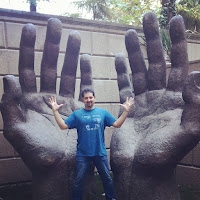Imagine Singapore, if Singapore had natural resources and was one of the largest countries in the world. Kazakhstan, where I spent two weeks watching the World Wrestling Championships, is only 27 years old. Tajiks, Kyrgyz, Uzbeks, Russians, and Kazakhs blend in seamlessly, and the British have considerable influence. Its capital was renamed five times in the last 60 years: Akmolinsk, Tselinograd, Aqmola, Astana, and now Nur-Sultan. Along the way, the capital moved from Almaty--bordering China and Kyrgyzstan in the southeast--closer to Russia in the north.
Within historical context, Kazakhstan's rise from Soviet vassal to independent modern state is miraculous--if only because potential pitfalls were so numerous. Following the collapse of the Soviet Union, many countries were left on their own. One of these countries was Kazakhstan, the world's ninth largest. Into the void came the European Bank for Reconstruction and Development (EBRD), which invested nearly 9.1 billion USD since 1991. Today, it's clear who has the most influence: the EU, Russia, and China.
One may want to remind increasingly nationalistic Western voters these global investments were prudent because they helped increase worldwide supplies of Kazakhstan's uranium, oil, natural gas, and tin--while giving foreign powers the ability to influence political affairs in mutually beneficial ways. In Nur-Sultan, a Huawei building towers over pristine asphalt roads containing Russia's old Lada cars as well as brand-new Toyotas, a testament to steady global investments that promoted free trade while avoiding enemies. (Kazakhstan does business with both Iran and Israel.)
Nur-Sultan is named after Nursultan Nazarbayev, Kazahkstan's president from April 1990 until March 2019 and former member of the Communist Party. Many English language articles allege corruption, but do not provide relevant background. First, as a member of a single party governance system focused on GDP growth--which he delivered--the assumption was any opposition group formed during the Cold War would be funded by foreign powers. (Given the CIA's track record, this assumption was not without merit.) Second, most of the allegations concern activities designed to circumvent the United States' arbitrary political preferences, including regarding Iran. (Unlike the United States, Kazakhstan has no enemies, so one could argue its multi-vector foreign policy, which emphasizes good relations with other states while balancing Chinese and Russian influence, has been successful.)
Above all, Nazarbayev doesn't get the credit he deserves for advancing Kazakhstan from a country with the world's fourth-largest stockpile of nuclear weapons to a model for de-proliferation.
It's true Kazakhstan's most valuable company is KazAtomProm, a nuclear company, but its privatization has provided checks and balances without sacrificing nuclear energy and knowledge--knowledge that came with tragic consequences. The Soviets conducted over 500 military experiments with nuclear weapons in Kazakhstan, mostly at the Semipalatinsk Test Site, causing radiation sickness and birth defects. It was Nazarbayev who closed the Semipalatinsk Test Site and who subsequently gave Kazakhstan so much credibility in nuclear affairs that it held international talks in Almaty as part of worldwide efforts to encourage Iran to pursue a similarly peaceful nuclear energy model. In addition to nuclear weapons, the Soviets left a legacy of space exploration, now in the form of KazCosmos, Kazakhstan's more complicated version of NASA. In short, any way you view the country's development, the number of drastic failures that could have occurred during the transition of a left-behind nuclear and space-ready country into a respected member of the United Nations were vast, leaving little margin for error. For that reason alone, it's hard to criticize Kazakhstan, though Human Rights Watch has no such qualms, reporting, "There was no meaningful improvement to Kazakhstan’s poor human rights record in 2018."
A few casual observations are in order: Russian and Kazakh are the most common languages, and in larger cities, most people can speak at least a bit of both. A blend of Mongolian and Russian have created a striking hybrid of white-colored faces and Asiatic eyes, made even more eye-catching when locals bleach their hair blond or wear blue contacts. As for the physical landscape, it's all new. Think of it as the "Las Vegas development model": you have land in the middle of nowhere, a relatively small population, and no restraints on what or how you can build. One result is uniquely-designed buildings, but I was most impressed with the overall layout.
You can see architects had a single plan for the city center, creating angles where prominent buildings could be viewed inside arches of nearby places. Throw in old-time Las Vegas neon lights, and NurSultan starts to look like a place that's co-opted the mafia and provided plenty of space for everyone to play nice--for now.
Will Kazakhstan's steady development continue in peaceful and sustainable ways? According to The Astana Times, "'The share of non-oil revenues is growing steadily from 61.4% [in 2019] to 71.2% in 2022,'" a good sign. At the same time, "the number of civil servants and employees in national [government-owned] companies will be reduced 25% [from] 2020-2024," a predictable cause of grievances, even if necessary; in "2018, government procurement totaled 4.4 trillion tenge [almost 63 billion USD], 75% of which were carried out in a non-competitive way through purchases from one source"; and "the number of targeted social assistance [welfare] recipients [grew] from approximately 77,000 to more than 1.4 million in five years... [and] spending on social support has increased 17 times since 2017." In addition to the above issues, respecting different ethnic groups while enforcing primary use of an uncommon language, Kazakh, may prove difficult. Ultimately, like space, Kazakhstan's sheer vastness provides hope--as well as growing pains--assuming the country is able to maintain its balancing act.
© Matthew Mehdi Rafat (2019)
Bonus: Kazakhstan's museums had a wide gap regarding two major historical events: 1) the famine of 1932-34, which apparently wiped out one-third of its population due to the Soviet Union's forced farming collectivization (an action Nikita Khrushchev criticized in his 1963 book, Khrushchev Speaks); and 2) several waves of forced deportations into Kazakhstan by the Soviet Union, especially from Ukraine. The latter is interesting because it could help establish a historical narrative of Kazakhstan as a country of involuntary refugees, providing a more tolerant basis for future immigration.
Update: unrest and rioting in January 2022 caught many by surprise, but the result of reducing welfare benefits while increasing everyday costs, including fuel, seems predictable. The world wants to shun petroleum-based output but is unready to implement climate-friendly technology on a mass scale. Until the gap between promise and reality is bridged, many governments--not just Kazakhstan--face challenges modernizing their economies while preserving social stability.
Within historical context, Kazakhstan's rise from Soviet vassal to independent modern state is miraculous--if only because potential pitfalls were so numerous. Following the collapse of the Soviet Union, many countries were left on their own. One of these countries was Kazakhstan, the world's ninth largest. Into the void came the European Bank for Reconstruction and Development (EBRD), which invested nearly 9.1 billion USD since 1991. Today, it's clear who has the most influence: the EU, Russia, and China.
 |
| Look at the flags displayed outside a NurSultan strip mall. |
Nur-Sultan is named after Nursultan Nazarbayev, Kazahkstan's president from April 1990 until March 2019 and former member of the Communist Party. Many English language articles allege corruption, but do not provide relevant background. First, as a member of a single party governance system focused on GDP growth--which he delivered--the assumption was any opposition group formed during the Cold War would be funded by foreign powers. (Given the CIA's track record, this assumption was not without merit.) Second, most of the allegations concern activities designed to circumvent the United States' arbitrary political preferences, including regarding Iran. (Unlike the United States, Kazakhstan has no enemies, so one could argue its multi-vector foreign policy, which emphasizes good relations with other states while balancing Chinese and Russian influence, has been successful.)
Above all, Nazarbayev doesn't get the credit he deserves for advancing Kazakhstan from a country with the world's fourth-largest stockpile of nuclear weapons to a model for de-proliferation.
It's true Kazakhstan's most valuable company is KazAtomProm, a nuclear company, but its privatization has provided checks and balances without sacrificing nuclear energy and knowledge--knowledge that came with tragic consequences. The Soviets conducted over 500 military experiments with nuclear weapons in Kazakhstan, mostly at the Semipalatinsk Test Site, causing radiation sickness and birth defects. It was Nazarbayev who closed the Semipalatinsk Test Site and who subsequently gave Kazakhstan so much credibility in nuclear affairs that it held international talks in Almaty as part of worldwide efforts to encourage Iran to pursue a similarly peaceful nuclear energy model. In addition to nuclear weapons, the Soviets left a legacy of space exploration, now in the form of KazCosmos, Kazakhstan's more complicated version of NASA. In short, any way you view the country's development, the number of drastic failures that could have occurred during the transition of a left-behind nuclear and space-ready country into a respected member of the United Nations were vast, leaving little margin for error. For that reason alone, it's hard to criticize Kazakhstan, though Human Rights Watch has no such qualms, reporting, "There was no meaningful improvement to Kazakhstan’s poor human rights record in 2018."
A few casual observations are in order: Russian and Kazakh are the most common languages, and in larger cities, most people can speak at least a bit of both. A blend of Mongolian and Russian have created a striking hybrid of white-colored faces and Asiatic eyes, made even more eye-catching when locals bleach their hair blond or wear blue contacts. As for the physical landscape, it's all new. Think of it as the "Las Vegas development model": you have land in the middle of nowhere, a relatively small population, and no restraints on what or how you can build. One result is uniquely-designed buildings, but I was most impressed with the overall layout.
 |
| Inside a shopping mall. |
 |
| Outside the shopping mall. |
 |
| Russian Church. I tried to buy a St. Christopher card but they didn't have any. |
 |
| Hazrat Sultan Mosque |
© Matthew Mehdi Rafat (2019)
Bonus: Kazakhstan's museums had a wide gap regarding two major historical events: 1) the famine of 1932-34, which apparently wiped out one-third of its population due to the Soviet Union's forced farming collectivization (an action Nikita Khrushchev criticized in his 1963 book, Khrushchev Speaks); and 2) several waves of forced deportations into Kazakhstan by the Soviet Union, especially from Ukraine. The latter is interesting because it could help establish a historical narrative of Kazakhstan as a country of involuntary refugees, providing a more tolerant basis for future immigration.
Update: unrest and rioting in January 2022 caught many by surprise, but the result of reducing welfare benefits while increasing everyday costs, including fuel, seems predictable. The world wants to shun petroleum-based output but is unready to implement climate-friendly technology on a mass scale. Until the gap between promise and reality is bridged, many governments--not just Kazakhstan--face challenges modernizing their economies while preserving social stability.











